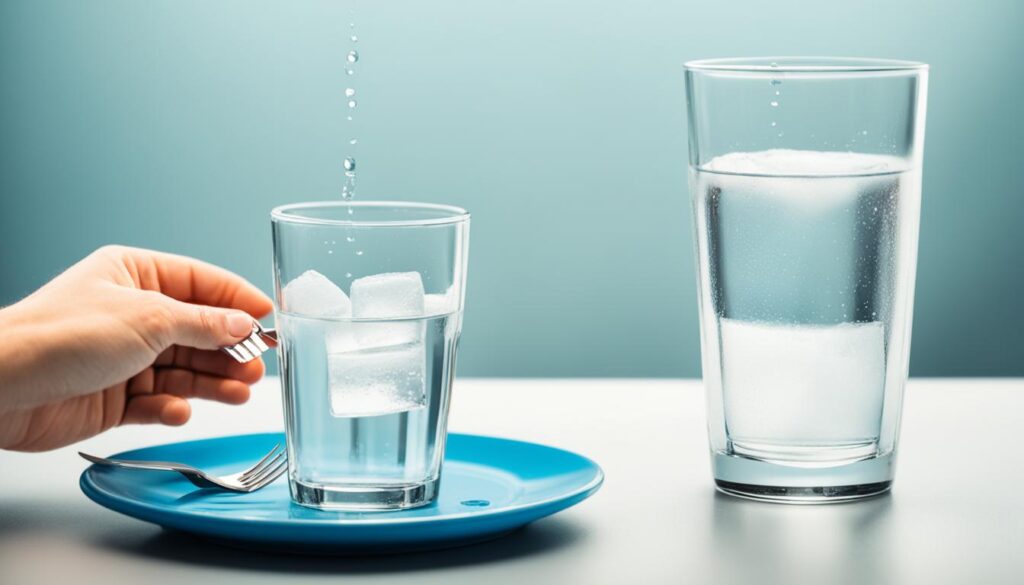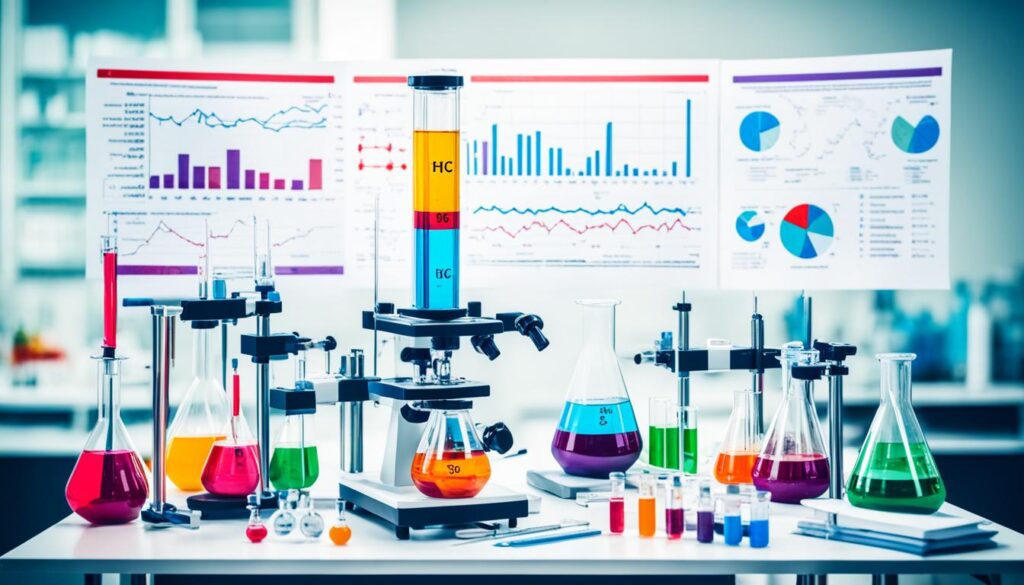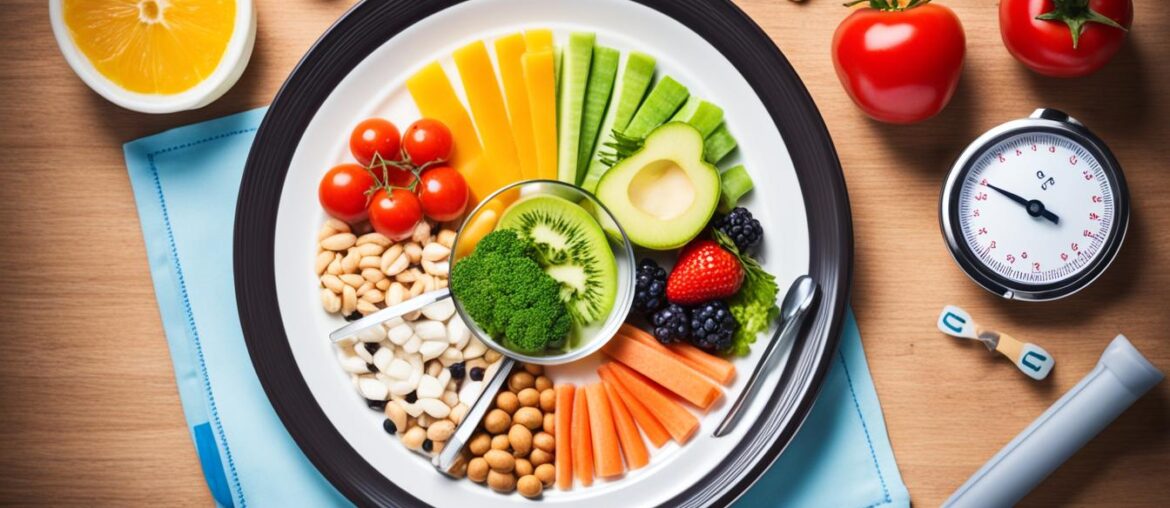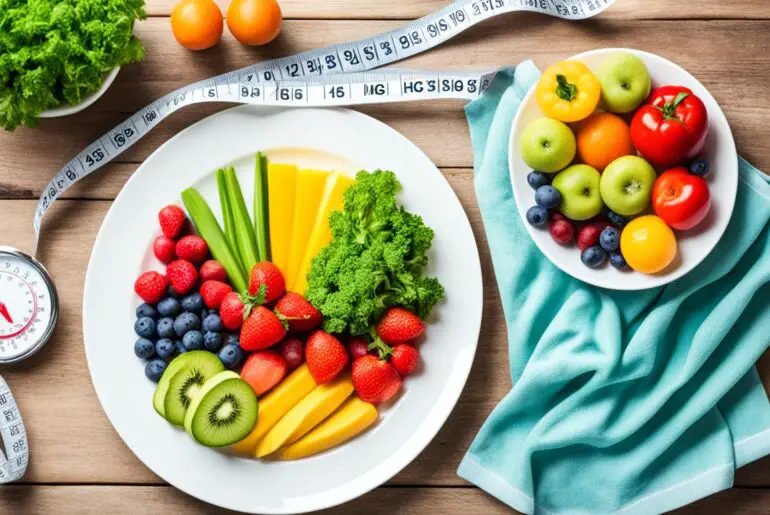Are you tired of restrictive diets that leave you feeling hungry and unsatisfied? Well, what if I told you there’s a weight loss protocol that claims to help control hunger while promoting rapid weight loss? Yes, it’s the HCG Protocol, a diet plan that has gained popularity for its hunger control strategies and promises of significant weight loss.
But does the HCG Protocol really live up to its hype? Can it truly help you achieve your weight loss goals without feeling constantly hungry? In this article, I will delve into the science behind the HCG diet and explore various hunger control tips and strategies associated with this protocol. So, fasten your seatbelts and get ready to uncover the truth about the HCG Protocol and hunger control.
Key Takeaways:
- The HCG Protocol claims to offer hunger control and rapid weight loss.
- Understanding the science behind the HCG diet is essential for evaluating its effectiveness.
- Implementing hunger control strategies such as proper meal timing, adequate protein intake, and incorporating appetite suppressants like coffee and green tea can help manage hunger on the HCG diet plan.
- It is important to consider alternative weight loss methods that focus on balanced nutrition and sustainable lifestyle changes for long-term success.
- Consulting with a healthcare professional before starting the HCG diet is crucial to ensure safety and personalized guidance.
Dealing with Hunger on the HCG Diet Program
In the early stages of the HCG Diet program, managing hunger and cravings can be a concern as your body adjusts to the changes. However, for the majority of patients, hunger is very manageable on the HCG Diet thanks to the therapeutic dose of rx HCG. This hormone helps the body utilize stored fat for fuel, resulting in decreased hunger and increased energy levels.
To effectively manage hunger on the HCG Diet, there are several strategies you can implement:
1. Drinking plenty of water:
Staying hydrated by drinking 2-4 liters of water per day can help curb hunger on the HCG Diet. Water not only fills your stomach, but it also helps to suppress appetite. Additionally, proper hydration is essential for overall health and weight loss.
2. Incorporating coffee and green tea:
Coffee and green tea can serve as natural appetite suppressants on the HCG Diet. The caffeine in coffee and the compounds in green tea help to decrease cravings and control appetite. It is important to drink coffee black and avoid adding any sweeteners except for Stevia, which is allowed on the program.
3. Spacing out meals:
Instead of having three large meals, consider spacing out your food throughout the day. Eating smaller, more frequent meals can help keep your metabolism active and prevent excessive hunger. This approach also allows for more consistent energy levels throughout the day.
4. Ensuring adequate protein intake:
Protein is an essential nutrient that helps promote satiety and reduce hunger. Make sure to consume the recommended 3.5-4 ounces of protein per meal on the HCG Diet. Adequate protein intake not only helps manage hunger but also supports muscle maintenance during weight loss.
5. Using “free” vegetables:
The HCG Diet allows for the inclusion of “free” vegetables, which are low in calories and can help manage hunger and cravings. Incorporating options such as celery, cucumber, radishes, lettuce, and cabbage into your meals adds volume and provides a sense of fullness without adding significant calories.
By following these strategies, you can effectively manage hunger and cravings on the HCG Diet program, allowing you to stay on track and achieve your weight loss goals.
Water as an Appetite Suppressant on the HCG Diet

Staying hydrated is an essential aspect of hunger control on the HCG Diet. By drinking 2-4 liters of water per day, you can effectively suppress your appetite and reduce the risk of overeating. Dehydration can lead to increased hunger and a higher likelihood of indulging in cheat meals or snacks. Therefore, maintaining optimal water intake is crucial to support your weight loss journey.
Additionally, when it comes to hydration on the HCG Diet, not all beverages are created equal. It’s important to choose the right options to achieve the best results. In addition to plain water, sparkling water with no additives and tea are acceptable choices for staying hydrated.
The Benefits of Staying Hydrated
Proper hydration offers several benefits when it comes to hunger control on the HCG Diet:
- Appetite Suppression: Water acts as a natural appetite suppressant, helping to reduce cravings and the desire to consume excess calories.
- Calorie-Free: Water is a calorie-free beverage, making it an ideal choice for hydration without adding extra calories to your daily intake.
- Detoxification: Drinking an adequate amount of water supports proper kidney function and helps flush out toxins from the body, promoting overall health and well-being.
- Reduces Fluid Retention: When the body is dehydrated, it tends to retain fluid, leading to bloating and water weight gain. By staying hydrated, you can help reduce fluid retention and achieve a leaner appearance.
- Improved Fat Utilization: Drinking enough water enhances the body’s ability to metabolize stored fat, facilitating weight loss during the HCG Diet.
Hydration Tips for the HCG Diet
To make sure you stay properly hydrated on the HCG Diet, consider the following tips:
- Carry a water bottle with you throughout the day as a visual reminder to drink an adequate amount of water.
- If plain water becomes monotonous, add a slice of lemon or cucumber to enhance the taste.
- Set reminders on your phone or use a hydration tracking app to ensure you meet your daily water intake goals.
- Avoid sugary beverages, as they can interfere with the HCG Diet and sabotage your weight loss efforts.
Remember, proper hydration is a crucial component of hunger control on the HCG Diet. By staying consistently hydrated, you can support your weight loss goals and maintain overall well-being.
Coffee as an Appetite Suppressant on the HCG Diet
When it comes to controlling hunger on the HCG Diet, coffee is a popular choice for many individuals. The caffeine found in coffee acts as a natural appetite suppressant, helping to curb those persistent cravings. However, it’s important to consume coffee black, as Stevia is the only allowed sweetener on the program.
If you’re sensitive to caffeine, it’s best to avoid using coffee as an appetite suppressant. Instead, opt for other hunger management strategies to ensure your HCG Diet experience is both effective and safe.
Incorporating coffee into your HCG Diet routine can be a helpful tool in controlling hunger. Just remember to drink it black to stay within the program guidelines and maximize your appetite suppression efforts.
Benefits of Using Coffee as an Appetite Suppressant
“Coffee has been discovered to be an effective appetite suppressant on the HCG Diet, thanks to its caffeine content.”
Using coffee as an appetite suppressant on the HCG Diet offers several benefits. Here are a few advantages that come with incorporating coffee into your hunger control strategies:
- Natural appetite suppression: Coffee’s caffeine content helps naturally control your appetite, reducing the desire for unnecessary snacking or overeating.
- Energy boost: Coffee provides an energy boost, helping you stay focused and energized throughout the day, which can be beneficial during the low-calorie phase of the HCG Diet.
- Metabolism support: Caffeine may offer a temporary metabolic boost, promoting fat burning and assisting with weight loss.
So, if you’re a coffee lover looking for a way to control hunger while on the HCG Diet, incorporating coffee as an appetite suppressant may be worth considering.
Green Tea as an Appetite Suppressant on the HCG Diet

When it comes to managing cravings and controlling appetite on the HCG Diet, incorporating green tea can be a game-changer. Green tea is well-known for its ability to suppress appetite and aid in weight loss. Its natural compounds, such as catechins and caffeine, work together to help decrease appetite, release substances that reduce hunger, and assist with fat burning.
By incorporating green tea into your HCG Diet plan, you can take advantage of its appetite-suppressing properties. Not only does green tea help control cravings, but it can also help manage hunger throughout the day. Incorporating this powerful elixir into your daily routine can provide a natural boost to your weight loss efforts.
Proper Meal Timing on the HCG Diet
When it comes to the HCG Diet, meal timing plays a vital role in optimizing results and managing hunger. Each individual has a unique way of regulating blood sugar, so finding the best rhythm for meal times is essential. Some patients find success with more frequent smaller meals, while others prefer one large meal. It’s crucial to listen to your body and adjust meal timing according to individual needs.
Spacing out meals on the HCG Diet can help control hunger and ensure a steady supply of energy throughout the day. By having smaller, more frequent meals, you can prevent blood sugar spikes and crashes, which can lead to increased cravings and hunger pangs. Consider dividing your daily food intake into several portions to keep your metabolism active and maintain stable energy levels.
On the other hand, some individuals find that having one larger meal on the HCG Diet works better for them. This approach allows them to feel more satisfied and satiated, reducing the temptation to snack or overeat. By having a substantial meal, they can focus on enjoying their food while still adhering to the diet protocol.
Ultimately, the choice between spacing out meals or having one large meal on the HCG Diet depends on personal preferences and how your body responds. It’s important to experiment and find what works best for you. Consulting a healthcare professional or a qualified HCG Diet coach can provide valuable guidance and help you create a meal plan tailored to your needs.
Sample Meal Timing Options:
| Option | Meal Timing |
|---|---|
| Frequent smaller meals | Breakfast, mid-morning snack, lunch, afternoon snack, dinner |
| One large meal | Intermittent fasting approach: skipped breakfast, lunch, afternoon snack, dinner |
| Combination approach | Intermittent fasting on some days, frequent smaller meals on others |
Remember, meal timing is just one aspect of the HCG Diet. It’s essential to follow the approved food list, portion guidelines, and any other specific recommendations provided by your healthcare professional or HCG Diet coach to achieve optimal results.
Protein Intake and Hunger Control on the HCG Diet
When it comes to hunger management on the HCG Diet, protein intake plays a crucial role. Consuming the recommended 3.5-4 ounces of protein per meal is essential for maintaining satisfaction throughout the day and suppressing appetite.
Lowering protein intake can lead to increased hunger between meals, which can make it challenging to stick to the diet plan. Adequate protein intake not only helps keep hunger at bay but also provides the body with the necessary nutrients for proper functioning.
The Importance of Protein on HCG
Protein is known for its ability to promote satiety and keep you feeling full for longer periods. It takes longer to digest compared to carbohydrates and fats, which means it provides a lasting feeling of satisfaction after a meal. By incorporating an adequate amount of protein into your HCG meals, you can effectively manage hunger and prevent unnecessary snacking.
Appetite Suppression with Protein on the HCG Diet
Protein is also essential for appetite suppression. It stimulates the release of hormones that signal fullness to the brain, reducing the desire to eat more. This mechanism helps you stay on track with your HCG diet by preventing overeating and reducing cravings.
Furthermore, protein plays a vital role in preserving muscle mass during the weight loss process. When following a low-calorie diet like HCG, the body may turn to muscle for energy. However, sufficient protein intake helps protect and preserve lean muscle mass, which is essential for maintaining overall strength and metabolism.
When planning your HCG meals, be sure to include lean sources of protein such as chicken breast, lean beef, fish, tofu, or cottage cheese. These options provide high-quality protein while keeping the calorie count in check.
| Protein Sources on the HCG Diet | Protein Content per 3.5 ounces |
|---|---|
| Chicken Breast (boneless, skinless) | 25 grams |
| Lean Beef (95% lean) | 23 grams |
| Fish (cod, haddock, flounder) | 20-22 grams |
| Tofu | 8 grams |
| Cottage Cheese (1% fat) | 12 grams |
Table: Protein Content of Common Sources
Remember, protein intake is just one aspect of hunger management on the HCG Diet. Staying hydrated, spacing out meals, and incorporating “free” vegetables are also crucial strategies for controlling hunger and maintaining a successful HCG weight loss journey.
Incorporating Free Vegetables into the HCG Diet

The HCG Diet allows for incorporating “free vegetables” into meals, which can play a crucial role in hunger control and overall success on the program.
These free vegetables include celery, cucumber, radishes, lettuce, and cabbage. Not only do these vegetables contribute to important dietary fiber intake, but they also provide a sense of fullness, helping to manage hunger and cravings.
By incorporating these free vegetables into meals, individuals on the HCG Diet can enhance their overall satisfaction and improve hunger management. These vegetables not only add volume to meals but also offer important nutrients and hydration.
Moreover, the fiber content in these vegetables aids in hunger management by slowing down digestion, prolonging the feeling of fullness, and stabilizing blood sugar levels.
Remember to prepare these vegetables without adding any oil, butter, or dressings, as the HCG Diet requires strict adherence to the prescribed protocol.
With the inclusion of these free vegetables, individuals can enjoy a delicious and well-balanced diet while effectively managing hunger and cravings.
| Vegetable | Description |
|---|---|
| Celery | Crunchy and refreshing, celery is low in calories and a great source of fiber. |
| Cucumber | Crisp and hydrating, cucumbers are an excellent choice to add volume to meals and snacks. |
| Radishes | Peppery and tangy, radishes provide a delightful crunch and add a burst of flavor to dishes. |
| Lettuce | Lettuce varieties like romaine, spinach, and iceberg offer a refreshing base for salads and wraps. |
| Cabbage | Cabbage is a versatile vegetable that can be used in stir-fries, soups, and slaws. |
Controlling Hunger with Distractions and Lifestyle Changes on the HCG Diet

Along with making dietary changes, there are various strategies you can employ to manage hunger on the HCG Diet. By incorporating distractions and making lifestyle adjustments, you can effectively curb cravings and maintain appetite control.
Engaging in Physical Activity
Instead of reaching for a snack when hunger strikes, try engaging in physical activity or exercise. Not only does exercise help burn calories, but it also serves as a distraction from food cravings. Whether it’s going for a walk, practicing yoga, or participating in a favorite sport, physical activity can redirect your focus and help manage hunger.
Plenty of Water and Enjoyable Activities
Drinking plenty of water throughout the day can also aid in hunger control on the HCG Diet. Staying hydrated can help reduce the feeling of hunger and keep cravings at bay. Additionally, planning enjoyable activities, such as movie nights, spending time with loved ones, or pursuing a hobby, can provide distractions and help shift your attention away from food.
Changing Your Mindset
One effective strategy for appetite management is to change your mindset around food. View food as fuel for your body rather than a hobby or source of entertainment. By focusing on the nutritional value of the food you eat and understanding how it nourishes your body, you can develop a healthier relationship with food and better control hunger.
Implementing these hunger control strategies on the HCG Diet, along with the dietary tips mentioned in previous sections, can significantly improve your experience on the program. Remember, the HCG Diet is a unique weight loss protocol that requires commitment and discipline. By making these lifestyle changes and practicing distraction techniques, you can successfully manage hunger and achieve your weight loss goals.
Understanding the Science Behind the HCG Diet

The HCG Diet is often associated with claims of rapid weight loss and the use of the HCG hormone. However, a closer look at the science behind this diet reveals some important facts.
The HCG hormone, which is naturally produced in high levels during early pregnancy, has been incorporated into the HCG Diet for weight loss purposes. It is believed that this hormone helps support fat burning and prevents muscle loss during extreme calorie restriction. However, scientific research has shown that the primary driver of weight loss on the HCG Diet is the severe calorie restriction itself, rather than the hormone.
Multiple studies have found that the HCG hormone does not significantly impact weight loss or body composition outcomes when compared to a very low-calorie diet without HCG supplementation. This suggests that the calorie restriction is the key factor in achieving weight loss on this diet.
In addition to the lack of evidence supporting the weight loss benefits of the HCG hormone, there is also no scientific basis for claims that the HCG Diet can prevent muscle loss or boost metabolism. These claims have not been substantiated by rigorous research.
While the HCG Diet may result in temporary weight loss, it is important to consider the potential risks and lack of scientific evidence when deciding whether to pursue this diet. Consulting with a healthcare professional is essential to ensure a safe and effective weight loss journey.
| Key Points | Explanation |
|---|---|
| The HCG hormone | Produced during early pregnancy |
| HCG Diet | Incorporates the use of the HCG hormone for weight loss |
| Weight loss on HCG Diet | Primarily due to extreme calorie restriction, not the hormone |
| Lack of scientific evidence | No support for claims of muscle preservation or metabolism boosting |
| Risks and considerations | Consult a healthcare professional for personalized guidance |
The hCG Diet and Safety Concerns
When considering any weight loss program, it is essential to prioritize safety and understand the potential risks involved. The hCG Diet, however, has raised significant concerns in terms of safety and effectiveness.
First and foremost, it’s crucial to note that the U.S. Food and Drug Administration (FDA) has deemed the hCG Diet illegal and dangerous. OTC (over-the-counter) hCG products, which are prevalent in the market, are unregulated and often contain unknown ingredients. These products cannot be trusted for their safety or efficacy.
Furthermore, the hCG Diet has been associated with various side effects. Common complaints include headaches, fatigue, and depression. These symptoms can significantly impact one’s overall well-being and quality of life.
Additionally, the hCG Diet’s strict calorie restriction can lead to muscle loss and a metabolic slowdown. Severe calorie deprivation can have detrimental effects on the body, disrupting its natural functions and potentially leading to long-term health consequences.
Given the potential risks and lack of regulation, it is crucial to consult with a healthcare professional before considering the hCG Diet. They can provide a comprehensive evaluation of your health status, assess the appropriateness of the diet for your needs, and offer guidance on safe and sustainable weight loss methods.
Conclusion
The HCG Diet, known for its extreme calorie restriction, may result in rapid weight loss; however, there is insufficient evidence to support its effectiveness or claims of hunger suppression. It is important to consider alternatives that promote long-term weight loss success through a focus on balanced nutrition, regular physical activity, and sustainable lifestyle changes.
When it comes to weight loss, there are no shortcuts or quick fixes. Instead of resorting to drastic measures like the HCG Diet, I recommend exploring sustainable weight loss methods that prioritize overall health and well-being.
To achieve sustainable weight loss, it is crucial to adopt a balanced nutrition plan that includes a variety of whole foods, such as fruits, vegetables, lean protein, whole grains, and healthy fats. Additionally, incorporating regular physical activity, such as cardiovascular exercise and strength training, can help increase energy expenditure and support weight loss efforts.
Remember, consult with a healthcare professional who can provide personalized weight loss advice tailored to your specific needs and goals. By taking a holistic approach to weight loss, you can achieve lasting results while prioritizing your overall health.
FAQ
What is the HCG Protocol?
The HCG Protocol is a weight loss program that involves the use of the hormone HCG (human chorionic gonadotropin) along with a very low-calorie diet. It is designed to promote fat loss while preserving muscle mass.
How can I control hunger on the HCG Diet?
Hunger on the HCG Diet is typically manageable due to the therapeutic dose of rx HCG. However, if you experience hunger or cravings, there are several strategies you can try. These include staying hydrated, using coffee and green tea as appetite suppressants, spacing out meals, ensuring adequate protein intake, and incorporating “free” vegetables into meals.
How does drinking water help suppress appetite on the HCG Diet?
Staying hydrated by drinking 2-4 liters of water per day can help suppress appetite on the HCG Diet. Dehydration can lead to increased hunger and a higher risk of cheating. Sparkling water with no additives and tea are also acceptable options for hydration.
Can coffee help suppress appetite on the HCG Diet?
Coffee is known to be an effective appetite suppressant on the HCG Diet. The caffeine in coffee helps naturally control appetite. It’s important to drink coffee black, as Stevia is the only sweetener allowed on the program. Those sensitive to caffeine should avoid coffee as an appetite suppressant.
Can green tea help suppress appetite on the HCG Diet?
Green tea is a well-known appetite suppressant and can also aid in weight loss. Its compounds help decrease appetite, release substances that reduce appetite, and assist with fat burning. Incorporating green tea into the HCG Diet can help control cravings and manage hunger.
What should I consider when timing my meals on the HCG Diet?
Each individual has a unique way of regulating blood sugar, so finding the best rhythm for meal times is important on the HCG Diet. Some patients do better with more frequent smaller meals, while others find success with one larger meal. It’s essential to listen to your body and adjust meal timing according to individual needs.
How does protein intake affect hunger control on the HCG Diet?
Consuming the recommended 3.5-4 ounces of protein per meal is crucial on the HCG Diet. Lowering protein intake can lead to increased hunger between meals. Adequate protein intake helps suppress appetite and maintain satisfaction throughout the day.
Can incorporating “free” vegetables into the HCG Diet help control hunger?
Yes, the HCG Diet allows for “free vegetables” such as celery, cucumber, radishes, lettuce, and cabbage. These options not only provide important fiber but also help psychologically by providing a sense of fullness. Incorporating these free vegetables into meals can help manage hunger and cravings.
How can distractions and lifestyle changes help control hunger on the HCG Diet?
Along with dietary changes, distractions and lifestyle changes can help control hunger on the HCG Diet. Engaging in physical activity or exercise instead of reaching for a snack can curb cravings. Drinking plenty of water and planning enjoyable activities, such as movie nights, can also provide distractions from hunger. Changing the mindset around food and viewing it as fuel rather than a hobby can aid in hunger management.
What is the science behind the HCG Diet?
The HCG hormone, which is produced in high levels during early pregnancy, has been used in the HCG Diet for weight loss. However, studies have shown that weight loss on the HCG Diet is primarily due to extreme calorie restriction rather than the hormone itself. Additionally, there is no scientific evidence to support claims that the HCG Diet prevents muscle loss or boosts metabolism.
Is the HCG Diet safe?
The FDA has deemed the HCG Diet illegal and dangerous. Over-the-counter HCG products are unregulated and contain unknown ingredients. Side effects of the HCG Diet include headaches, fatigue, and depression. Severe calorie restriction can also lead to muscle loss and metabolic slowdown. It is important to consult with a healthcare professional before starting the HCG Diet.
Is the HCG Diet an effective long-term weight loss solution?
The HCG Diet can lead to rapid weight loss due to extreme calorie restriction, but there is no evidence to support its effectiveness or hunger suppression claims. Alternatives to the HCG Diet that focus on balanced nutrition, regular physical activity, and sustainable lifestyle changes are recommended for long-term weight loss success. Consult with a healthcare professional for personalized weight loss advice.




